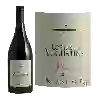
Winery La GravetteLe Pech de Vere Pic-Saint-Loup
This wine generally goes well with beef, veal or pasta.
Food and wine pairings with Le Pech de Vere Pic-Saint-Loup
Pairings that work perfectly with Le Pech de Vere Pic-Saint-Loup
Original food and wine pairings with Le Pech de Vere Pic-Saint-Loup
The Le Pech de Vere Pic-Saint-Loup of Winery La Gravette matches generally quite well with dishes of beef, pasta or veal such as recipes of beef luc lake, pasta with cherry tomatoes or sliced endives with ham.
Details and technical informations about Winery La Gravette's Le Pech de Vere Pic-Saint-Loup.
Discover the grape variety: Nero
An interspecific cross between Merlot Noir or Medoc Noir x Perle de Csaba and Villard Blanc x Gardonyi Geza, obtained in Hungary in 1965 by Josef Csizmazia. It can be found in the Netherlands, Belgium, Switzerland, Germany, Hungary, Poland, etc. In France, it is practically unknown. It should not be confused with two Italian grape varieties, the nero d'Avola and the nero di troia or uva di troia. Note that it is an ideal variety for amateur gardeners for the simple fact that it does not fear the main cryptogamic diseases such as mildew and oidium, to have an early maturity and moreover its grape is very tasty.
Informations about the Winery La Gravette
The Winery La Gravette is one of wineries to follow in Pic-Saint-Loup.. It offers 44 wines for sale in the of Pic-Saint-Loup to come and discover on site or to buy online.
The wine region of Pic-Saint-Loup
The wine region of Pic-Saint-Loup is located in the region of Languedoc of Languedoc-Roussillon of France. Wineries and vineyards like the Domaine Ermitage du Pic Saint Loup or the Domaine de Villeneuve produce mainly wines red, pink and white. The most planted grape varieties in the region of Pic-Saint-Loup are Mourvèdre, Roussanne and Viognier, they are then used in wines in blends or as a single variety. On the nose of Pic-Saint-Loup often reveals types of flavors of earth, straw or apricot and sometimes also flavors of peach, dark chocolate or anise.
The wine region of Languedoc-Roussillon
Languedoc (formerly Coteaux du Languedoc) is a key appellation used in the Languedoc-Roussillon wine region of southern France. It covers Dry table wines of all three colors (red, white and rosé) from the entire region, but leaves Sweet and Sparkling wines to other more specialized appellations. About 75% of all Languedoc wines are red, with the remaining 25% split roughly down the middle between whites and rosés. The appellation covers most of the Languedoc region and almost a third of all the vineyards in France.
The word of the wine: Basic wine
Dry, still wine intended for the production of sparkling wines (champagne, crémants, etc.). The basic wines undergo a second fermentation in the bottle for the production of carbon dioxide, and therefore of bubbles.














